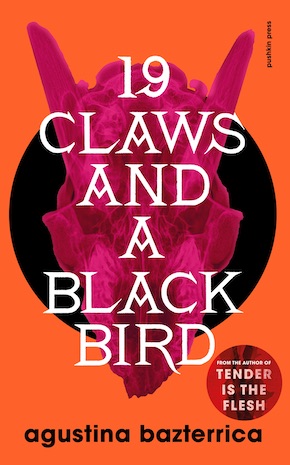Anita and happiness
by Agustina Bazterrica
Pablo detested Anita because he couldn’t prove what he’d suspected ever since they’d met: that she was an alien.
He hated her name because it wasn’t Ana, plain and simple, Ana with real problems like cellulitis, unpaid bills or anxiety brought on by the knowledge that human beings are a mere parenthesis between two unknowns. The name Anita evoked a defenceless being, a woman with a fragile constitution and a chronic illness, a woman you’d have to look after just because, for no other reason than that her name bore the diminutive “ita”. But Anita was much more than that, which is why Pablo decided to fall in love with her, if only to confirm whether her apparent weakness could be hiding a mastermind capable of conquering the universe, or a tireless predator harassing the human race.
One of Anita’s oddities was her addiction to work. No one could really be a workaholic dependent on cataloguing books at the neighbourhood library. She’d been hired because of her exceptional memory, and at first Pablo thought she was on the autism spectrum (she was so quiet, rigid, automatic), but when she recited, without pause, the first chapter of a book on supramolecular chemistry, and told him that the discipline was one of her passions, Pablo began to suspect that there was something strange about Anita.
Before she spoke, Anita would close her eyes slowly, as though she were activating some internal device that would dictate her words. She often began her sentences with “I have been thinking,” like when she said to Pablo, after closing her eyes, “I have been thinking we ought to engage in sexual intercourse.” Pablo looked at her and replied, “So you’re saying you want me to fuck you, to really fucking give it to you? Is that what you want, Anita?” He enunciated “Anita” with rage, with disdain, and she closed her eyes, the look on her face that of a civil servant stamping gross income forms, and answered, “I have been thinking I would.” She then stood up and took off her clothes in an orderly fashion, as though she were about to clean a window or throw out expired medication, with a weariness she didn’t want Pablo, the human, to notice. Pablo was a little embarrassed to find this turned him on, this ascetic ritual in which she took off her clothes, lay down on the bed, opened her legs and stared at the ceiling without saying a word.
He believed, more strongly with each passing day, that Anita was on a mission from another planet: “You are going to be called Anita because it sounds sweet, you are going to think with your eyes closed because it looks deep and you are going to be a workaholic because it seems serious. When you integrate into society, you will collect the largest amount of information possible. That way we can enslave the humans because they are an inferior, defective race. But you will connect to the best specimen you find.” It was for this reason that Pablo accepted – with fascination and a bit of contempt – many of Anita’s anomalies, like her obsession with letters addressed to the neighbours and with the postman, whom she spied on whenever he came by. Anita removed the letters from the postbox, read them and then returned them. Pablo was convinced they were messages in code she had to process, that they were sent by the commanders of Planet X and that the postman was one of her kind, another alien. He also didn’t say anything when Anita disappeared for hours or days without notice, because he understood she had to communicate with her fellow aliens and provide them with regular reports on the earthlings’ customs.
Anita didn’t swear. One day she sliced her finger and said, “The Republic of Argentina cut my finger.” Pablo couldn’t restrain the urge to laugh out loud, which was followed by the urge to throw her off a cliff. At times like these, he asked himself whether Anita, the supposed intergalactic hunter, was really just an alien who’d been banished from Planet X for being an imbecile.
A tremor never ran through her body, and Pablo was afraid of being a horrible lover to the alien, and of confirming the uselessness of the human species.”
Pablo loved her, but he couldn’t help abhorring her. When he fantasized about grabbing a knife, cutting her in half and finally finding the extraterrestrial inside her, he would look at her with something resembling admiration and nausea, and she, confused, would close her eyes, and a look of polished cement would come over her face, and she would say, “I have been thinking we need to copulate.” With a vague feeling of happiness, Pablo would give himself over to the chaste and artificial ritual, always on the lookout for mechanisms, hidden buttons, hatches that would reveal Anita’s body to be nothing more than a vessel that hid the actual extraterrestrial. She didn’t seem to mistrust Pablo’s exploratory caresses. He believed this was because she was overly focused on remembering the positions, the moans that had to be emitted at the right moment – oh, uh, yes, mmmm, god, a short ah, only with more energy than before – so that Pablo would notice she’d had an orgasm when she was supposed to have one. A tremor never ran through her body, and Pablo was afraid of being a horrible lover to the alien, and of confirming the uselessness of the human species.
Over time, Anita’s absences grew more frequent and Pablo began to miss the paranoia he’d felt at her appearing out of nowhere, silently, and looking at him as though he were a stranger, before closing her eyes and saying, “I have been thinking we need to reproduce,” and the mix of hatred and euphoria he felt at her choice of words, because the possibility of their having a hybrid baby filled him with horror and happiness.
One day Anita disappeared completely. Pablo was proud. He felt it meant she’d returned to Planet X with a report of what it was like to live with the human Pablo, an exceptional being. He ignored the neighbours’ malicious rumours that Anita had left him for the postman. He looked at them with pity because they existed within their trivial lives and didn’t know the truth.
One afternoon, he was on the subway and saw the hexagonal polygon face he’d missed so much. When he went up to her and said, “What are you doing here, Anita?” she answered, “I’m not Anita.” Pablo hesitated, but he insisted, “Come on, Anita, don’t fuck around, let’s go home.” She closed her eyes and said, “I’m not Anita, I’m Clarita.” Pablo looked at her carefully. She was almost identical to Anita. But there was something different about her eyes, her hair. She was prettier, if an alien could be described in that way. The invasion has begun, Pablo thought, and he felt a mix of terror and joy. He sat down by her side, smiled and said, “Hi, Clarita, I’m Pablo.”
from Nineteen Claws and a Black Bird, translated by Sarah Moses (Pushkin Press, £12.99)
—

Agustina Bazterrica is an Argentine novelist and short-story writer. She is a central figure in the Buenos Aires literary scene, working as a cultural organiser and workshop curator. Her novel Tender is the Flesh won the prestigious Premio Clarín Novela, has been translated into over twenty languages and sold more than half a million copies. Nineteen Claws and a Black Bird is out now from Pushkin Press.
Read more
agustinabazterrica.net
@AgusBazterrica
@PushkinPress
Author photo by Denise Giovaneli
Sarah Moses is a Canadian writer and translator of French and Spanish. Her previous translations include Agustina Bazterrica’s Tender is the Flesh (Pushkin Press, 2020) and Ariana Harwicz’ Die, My Love (Charco Press, 2017, co-translated with Carolina Orloff), which was longlisted for the International Booker Prize. Her story collection Strange Water is forthcoming from 1366 Books/Guernica Editions.
sarahdmoses.com

